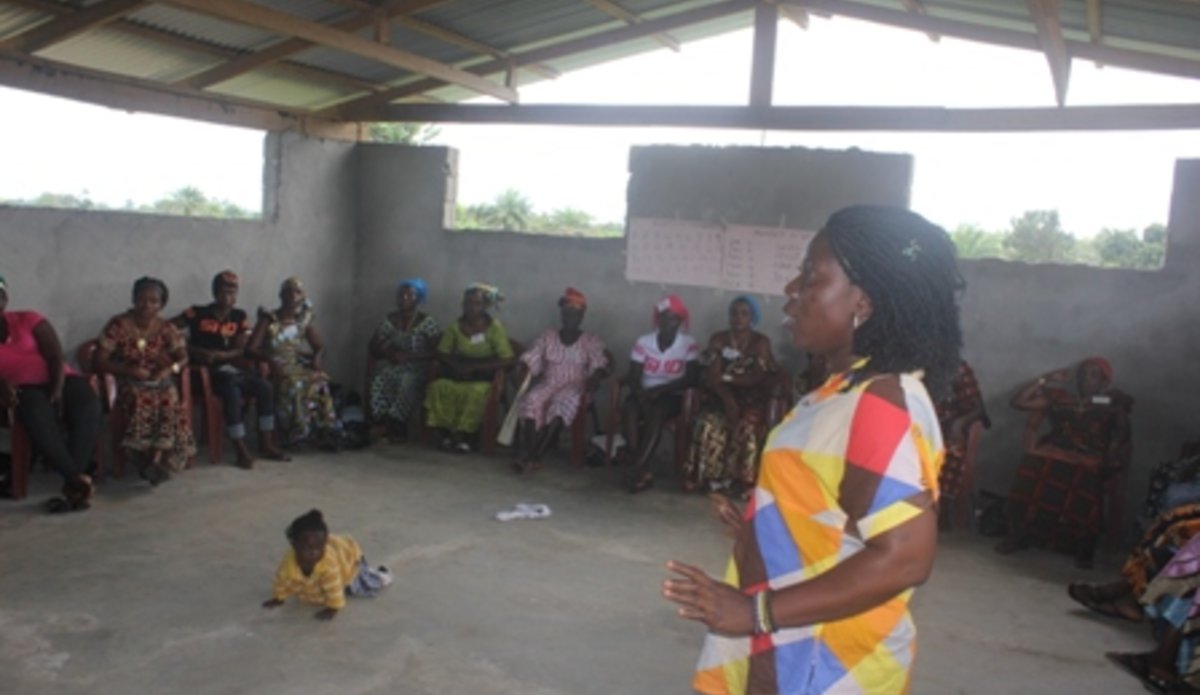Rural Women Embrace Family Planning
Twenty-five rural women from diverse communities in Rivercess County were recently part of a week-long training to learn about modern contraception, optimal spacing of children, and other basic family planning concepts thanks to support from UN Women and the United Nations Population Fund (UNFPA).
The training is being piloted as part of a strategy to ensure that local residents are empowered to act on the knowledge they receive and integrate health practices into their daily lives. The Plan Parenthood Association of Liberia is the implementing partner.
“UN Women is currently running a holistic peace and security programme in Cestos which is not only family planning, but a full access to justice component linked with economic empowerment,” says Ghoma Karloweah, UN Women Program Officer.
UN Women-supported peace hut initiative undertakes socio-economic training and activities including tye-dying, weaving and cassava processing. The economic independence gained through these activities is expected to give the women more bargaining power in their homes and courage to report cases of domestic abuse. “The economic base of women is further enhanced through the establishment of Village Saving and Loan Associations (VSLAs) providing women with access to micro-credit to improve and expand their businesses,” Karloweah said.
With support from UN Women, ChildrenSmile, a local NGO is providing literacy and vocational skills training such as baking, sewing, and fish seasoning and drying to compensate for the time spent in the peace huts and to build the women’s income base. Similar programmes are also benefiting residents of Grand Bassa, Grand Gedeh, Nimba, Gbarpolu, and Margibi Counties.
Women who attended the family planning training range in age from 24-60 years. Many of them are either working at home, farming and taking care of their children. Interactive activities were incorporated during teaching to keep the women engaged.
“My husband believes in traditional methods and doesn’t want us to adopt modern family planning methods. I will either convince him or prevent unwanted pregnancies secretly,” one participant whispered. For women in rural areas, injections that prevent pregnancies are more popular because they last for several months, reducing the need to travel more often to far away health centres.
There is resistance to the idea of contraception in rural communities as people fear it will lead to infertility. Cultural beliefs about the need for many children are strong, as many parents tend to rely on children for support during old age. In the minds of many rural dwellers, more children equal more socio-economic stability later in life.
Additionally, customary laws and practices often deny women and girls their sexual and reproductive rights, especially in rural areas. The high illiteracy rate among Liberian women has a negative impact on women’s health. However, recent legislations, including on rape and inheritance laws, are addressing some of these issues.
“Our rural women get married too early, give birth almost every year, and have four to five children at a young age,” says Regina Hodges, Medical Services Delivery Officer of the Plan Parenthood Association of Liberia.
Armed with booklets and communication training, Hodges and her colleague, Florence M. Kromah, conducted educational sessions with the women, dispelling falsehoods about family planning and preparing women in rural communities to lead better and healthier lives. The duo advised participants to adopt safe family planning methods.
“I thank UN Women, especially for the projects they are undertaking in Cestos City,” says Oretha Y. Johnson, believing firmly that such education will improve not only the health of rural women, but the welfare of their families and their communities.
In a small village on the way to Cestos City, one woman who only identified herself as Sunday-mar said “Look at me. I am 39 years old and I have four children. I am already tired but here we have no access to family planning.”
Hodges thinks the need for family planning commodities and services is increasing throughout the country in part because the number of women of reproductive age is growing. She said unintended pregnancies are widespread in rural communities, placing a burden on individuals, families, health systems, and socio-economic development.
Many women in the rural villages of Liberia have not received an education beyond primary school. They tend to marry and start having children at a very young age without knowing anything about their own bodies, proper nutrition, and how to care for their newborn babies.
The United Nations and the Government of Liberia have launched awareness campaigns to enable and encourage women to access sexual and reproductive health services. Last year, President Ellen Johnson Sirleaf launched a five-year plan to reduce maternal and infant mortality in the country. The plan also aims to enhance family planning among the population.
 UN
UN United Nations Peacekeeping
United Nations Peacekeeping





